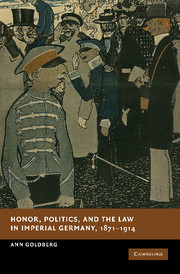1 - The development of the law
Published online by Cambridge University Press: 03 May 2010
Summary
German modernization, far from loosening the hold of a culture of honor, strengthened and expanded it. The law itself was crucial in this respect. In the course of the nineteenth century, German law was liberalized as it moved from an adjudication system based on estate (Stand) to one of formal equality and civil rights. Defamation law followed suit and was reconstituted along more democratic lines. But this transformation, rather than undermining the old values of honor, provided them with a new lease on life. The result, by the Kaiserreich, was a hybrid legal culture that merged key liberal legal principles – the Rechtsstaat, legal equality, civil rights – with a jurisprudence that assumed and protected the social hierarchies and status differences embedded in the concept of honor. In so doing, it provided the institutional basis for the vast expansion of defamation lawsuits, as the conflicts of modern society came to play themselves out in honor disputes. Legal developments in Prussia were key here, since it was Prussia's criminal code that formed the basis for the statutory laws regulating defamation after German unification in 1871. Two critical developments determined the shape of the Kaiserreich's defamation laws: (1) the end of a jurisprudence based on legally unequal estates; (2) the liberal rediscovery of the Privatklage, which was part of the broader fight against an arbitrary, politicized justice system – a cause that profoundly stamped mid-century liberalism.
Medieval and early-modern justice looked very different from what it would become in the nineteenth century.
- Type
- Chapter
- Information
- Publisher: Cambridge University PressPrint publication year: 2010



